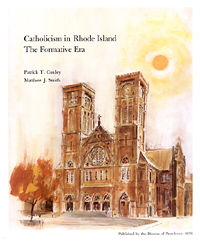
Catholicism in Rhode Island: The Formative Era
Patrick T. Conley and Matthew J. Smith
This volume — a contribution by the diocese to the state’s bicentennial observance — attempts to relate the history of Rhode Island Catholicism from its colonial origins down to the formal establishment of the Diocese of Providence in 1872. This is meant to be a ‘popular’ history designed for the general reader who wishes to know more of our state’s early Catholic heritage, but it is our hope that the book can be adapted for use in our schools.
By ‘popular’ history the authors mean that the work has been written with an emphasis on generalization and interpretation, with ample illustrations and without such scholarly paraphernalia as footnotes. However, the facts and statements presented herein have been thoroughly researched and drawn from every available primary and secondary source including manuscript correspondence, diaries, newspapers, broadsides, material remains and artifacts, public documents, state, local and parish histories, published scholarly monographs and unpublished seminar papers. A select annotated listing of these sources will be found in the bibliographic essay that follows the text.
This account of the formative era of Rhode Island Catholicism differs from earlier versions which are primarily institutional in nature. We have attempted to broaden our focus to include not only the church-building process and biographical studies of bishops and prominent priests but also such topics as the religious role of the laity and their socio-economic condition, the religious factor in politics and constitutional development, the relation of ethnicity and religion, the impact of national secular and religious currents on local Catholicism and the contributions of Catholics, both clerical and lay, to Rhode Island’s cultural, economic, social and political development.
This book is mainly descriptive but certain themes emerge — the most prominent of which is the struggle for survival waged by Rhode Island’s early Catholics in the face of intolerance, nativism and discrimination. The secure, well-established and influential Church of today is the legacy of the sacrifice, zeal and dedication of its nineteenth century founders. Their efforts deserve to be recounted and appreciated.
(from the preface)